- Home
- Jess Walter
Land of the Blind Page 5
Land of the Blind Read online
Page 5
He talked about it for a couple of days, telling me things that Eli had allegedly said about me, that I was a fairy and a fruitcake and that I had humped my own grandma. I remember wondering, if I were a fairy, would I want to hump my grandma?
I managed to avoid fighting those first days, saying that Eli wasn’t worth it, or I didn’t want to get snot on my fists, stuff like that. But Pete kept bringing it up, saying that if I didn’t fight Eli people would assume it was because I was his boyfriend. Still, I avoided it. And every day Pete would hover over me. “When are you gonna fight that punk? He’s making you look stupid.”
One morning, sitting next to Everson, I leaned over and asked what he would do.
“I don’t fight,” he said, without looking up from the joint in his lap.
“Why not?”
“No one expects me to.”
“Why?”
He shrugged. “Against my nature.”
“If I don’t beat up Eli, then Pete’s gonna kill me.”
“Yeah,” he said. “It works that way.”
At recess, I sought out the lovely Dana Brett, who had impressed me with her courage and humanity when she didn’t scoot her desk away from Eli’s that day. I explained to her my dilemma, without looking up into her angelic face, her Nestlé’s brown eyes. She listened patiently, while a few feet away the other girls in our class asked questions of romance to a Magic Eight Ball. She would always be unlike those other girls, more measured and rational.
“Are you afraid of him?” Dana asked when I’d explained my problem.
“Eli? Of course not.”
“Well,” she said, the long lashes flashing down once on those big, round eyes, “then you better fight. If you don’t, they’re gonna say you’re a puss.”
I think we are capable of fooling ourselves in a lot of different ways. People talk about what makes a child an adult, as if there is some physical or emotional or mental threshold we cross, but I tell you this, and if you are honest with yourself you will know it is true: the thing that makes us adult is our ability to delude ourselves. That’s all. Children know what they are. Try telling a fat kid he looks good, or a child who is a bad athlete that he just needs to try harder. He knows better. But as adults, we start to believe the bullshit. We tell ourselves that cheating on our taxes isn’t really stealing and that the job candidate with long legs is really a better fit for the company. We look at our lives and pretend that we aren’t money hungry and consumed by status, that we have kept the morals and ethics of our college years, that we are healthy and not fat, distinguished and not old, that gray looks sophisticated in our hair, that it doesn’t hurt her if she doesn’t know, that it’s not really lying if he doesn’t find out, that we deserve a break now and then, that we had no choice, meant no harm, didn’t know what would happen, would take it back if we could, that we are still liberal and open minded and easygoing and not afraid. We come up with rationalizations and justifications after the fact, and then we convince ourselves that these things are true. We pretend we are doing the best we can.
But every man dies the death of his own making.
Me? I took a step toward being an adult that day. I told myself that if I didn’t beat Eli up, Pete Decker would pound us both. I told myself that I would go easy on Eli, that I’d pull my punches. I told myself that we would make eye contact and he would see that I didn’t really mean this, that I could do this and not actually do it, that I wasn’t beating him up, not like Pete Decker and Matt Woodbridge did, that I was different from them. That I was different. That is the biggest lie—that we are different than they are.
The brakes squealed on the bus and Pete was up behind me, rubbing my shoulders, extolling me, whispering random combinations of guttural words in my ear.
“Fuck up that fat dickbreath cockbite fuckball!”
“Kick that smelly fag dipshit’s ass!”
We moved along the aisle. Below our feet, the floor of the bus was lined with a grooved rubber strip and my tennis shoes squeaked as I moved to the front of the bus. Pete hovered behind, inches from my ear: “Break his fuckin’ four-eyed, pig-nosed face!”
Such trouble has a way of congealing the passengers of a school bus, and I felt their oozy, collective eyes on me as I moved down the aisle. I was about to beat up the most pitiful kid in twelve grades. I, the kid who offered cigarettes in fealty to Pete Decker, was about to join his ranks. In their eyes, how could I be any different?
Eli was the first off, of course, and he’d begun moving in his quick crooked shuffle, bent at the waist, trying to hide in his own clothes.
“Boyle!” Pete yelled from behind me. “Hey, Boyle!” I felt Pete gently take my book bag and set it on the ground. Eli just kept moving, and Pete dispatched his two goons to run after him and drag him back. I stood under the willow tree, my mouth dry. The bus pulled away and I watched it go, the faces pressed up against the back window, kids having flooded to Pete Decker’s seat, hoping to see the first moments of our fight before the bus pulled away.
The goons dragged Eli back and pushed him toward me. Still he didn’t look up.
“Are you gonna fight, or are you a fag?” Pete asked Eli.
He didn’t answer. He stood in front of me, staring at his shoes. He shifted his weight and his leg braces clacked together.
Pete pushed Eli in the shoulder. “Come on, queer.”
I raised my fists slowly and moved forward. He looked up then, and I realized I’d never seen Eli full-on like this, from the front. He was usually looking sideways or averting his gaze or covering his mouth or looking away before you could get a fix on his face. It was egg shaped—too much forehead and chin, all the features and pimples packed in between, the black glasses, the braces on his teeth, like some perfect rendering of the collective nightmares of adolescents.
Pete Decker stepped away and it was just Eli and I squared off in the gravel between the street and Will the Hippie’s front yard. Our eyes met and I tried to let him see that I was sorry for what I had to do. He sighed.
And then he hit me. Twice. The first punch connected with my nose, the second clipped my ear. I kicked at him and caught him in the leg and he hit me again in the face, a hammer that buckled my knees and sent me sprawling, crying, onto the ground. From my side I looked up through teary eyes to see Eli running away, crying, his knee braces rattling, Pete Decker a few steps behind. Pete caught him and dragged him to the ground and by the time I got to my feet, he was pounding on Eli. I felt my nose. It was bleeding. Twenty yards up the road, so was Eli’s. Pete just kept cocking his fist and letting Eli have it. Eli was crying for help, honking like a goose, trying to squirm away. Pete’s goons were cheering the beating their boss was delivering. Finally Pete climbed off him, opened Eli’s book bag and scattered everything, set his lunch pail on the ground and stomped it into scrap metal. Then he kicked Eli once in the side and came back toward me.
“That was a good fight,” he said, slapping me on the back. “That fucker jumped you, man. He didn’t fight fair at all.” Pete was panting. There was sweat on his upper lip, making the hair below his nose look almost like a mustache. I looked at one of the goons, who seemed ready enough to accept Pete’s description of the good fight and the idea that I had somehow been jumped, and I wondered if Pete’s goons even processed their own thoughts. “You’d have killed him if he fought fair,” Pete said. And he began walking toward his house, a goon on either side.
I looked up the street, to where Eli had already gathered his things. He was no longer crying, and he seemed oblivious to the damage he’d done to my face. He walked home, bent at the waist, as if nothing had happened.
At home my sisters were playing Barbies on the porch, and they stared at me wide eyed as I came up the sidewalk. Being all of five, Meg saw her job as explaining the world to Shawna, and so she bent over and whispered, “Clark got all beat up.”
“By bad guys?” Shawna asked, and Meg nodded.
Ben had stayed home sick that day
and he was on the couch, reading a Flash comic book. He looked at me as if I were covered in blood—which, of course, I was. “Hot Christ buns,” he said, “what happened to you?”
That brought my mother from the kitchen, where she usually spent the afternoons sorting through the Avon cosmetics and sundries that she stockpiled in the house. She was supposed to sell these Avon products door-to-door in the neighborhood and at swanky Avon parties that she shamed friends and relatives into attending, but my mother didn’t like to bother people, and so the Avon products had taken over our house and our basement was filled with boxes of foundation eyeliner and birdhouses and perfume (I got regular nighttime erections just thinking about the case of “Nights of Romance” perfume underneath my bed.) “Who did this to you? Was it that boy, Pete Drecker?” She waved a pair of Avon candlesticks at me. “I’m going to march down there and talk to his mother.”
“No,” I said. “I just fell down.”
But she wouldn’t buy it, and finally I had to admit that it was in fact Eli Boyle who had done this to me.
Ben slapped his forehead. “Jesus meet the neighbors!”
Even Mom was changed by this bit of news. “Huh,” she said. “The boy with the…” She gestured around her face as if we were talking about the Elephant Man.
“Yeah,” I said, staring at the ground.
“Oh,” she said, and looked down at the candlesticks in her hands. The idea of waving candlesticks at the mother of such a boy was less interesting and my mother just sort of shrugged and half turned back toward the kitchen, suddenly faced with a problem potentially worse than her son being beaten up by a bully: her son being beaten up by an Eli Boyle. “You…um…you should talk to your father about defending yourself, Clark,” she said. “And you shouldn’t get into fights.”
Staring at my bloodied face, Ben shook his head. “I’ll say.”
6 | MUHAMMAD ELI DISAPPEARED
Muhammad Eli disappeared from the bus stop the very next day. I guess his mom began driving him to school, but however he got there he was in class when I arrived, sitting in his desk, open-pit nose mining. The nickname—Muhammad Eli—was Ben’s idea and I have to say that I was happy that it didn’t catch on. In fact, I was shocked that day to hear that I’d actually kicked Eli’s ass. Even the people who’d witnessed my beating bought into Pete Decker’s fiction and suddenly I understood the power of propaganda. At the bus stop guys clapped me on the back and told me they’d heard it was a great fight.
“That asshole’s lucky he ran away,” said one of Pete’s thugs. “Clark was about to kick his ass.”
“About to?” Pete asked. “My boy whipped his ass.”
At recess, Dana Brett strode up to me in her suede boots and miniskirt and told me matter-of-factly that I was a bully. I didn’t know what to say: cop to being a bully (which I wasn’t), or admit that a spaz like Eli had actually beaten me up? At lunch I watched Eli work the edges of the playground, the way he always did, picking his way along the chain-link fence. I wanted to apologize. I really did. But how do you apologize to someone who has, in fact, beaten you up?
Eli wasn’t on the bus that afternoon either. I sat staring out the window, the sun high and bright, washing the blue from the sky.
“Clark the Hammer,” Pete Decker said. “Big Bad Clark Mason.”
The next morning Eli still didn’t show at our stop, and Pete and his gang took this as proof that—despite what they’d seen—I actually inflicted great damage upon my opponent. I slumped past Eli’s empty seat behind the bus driver and sat near the back. When Woodbridge got on the bus he stopped at my seat, stuck out his lower lip, and nodded slowly, approvingly, as if checking out the latest model of bully.
“I heard you beat that fat, greasy-haired faggot’s ass,” he said. “Queer probably transferred to another school.”
“Fuckin’ retard fag queer,” Pete muttered.
“Yeah,” Woodbridge said. “Fuckin’ fag.”
At school, I looked for opportunities to make eye contact with Eli, a shrug that might communicate that we were both victims in this, that we had both come out with bloody noses, that no harm was done. But Eli had found his place beneath the rest of us, and he scurried around with his head bowed, staring at his black shoes.
I tried to catch sight of his mother driving him to and from school, but they left early for school and apparently left late for home. Spring was a blink, just a suggestion of time, all shadow and no cast; it was the first season that I remember going faster than I expected, and the first time I realized that time actually moved in a certain direction, toward something that wasn’t just the piling up of days and weeks and school years, but a point that had its own weight. It was like the first time you realize, as a kid, that all the escalator steps aren’t collected in the basement. That spring I saw myself in junior high and high school and beyond, and I saw the kids before me and after me as fellow travelers, and like any whiff of mortality it was powerful and frightening. I’d like to say that I found in this season of epiphany the time to offer a quiet apology to Eli, but to be honest the days were made up of Presidential Fitness Tests and Smear the Queer and the accidental grazing of Marcia Donnely’s left boob, one of only two actual boobs in our class (Marcia Donnely’s right being the other). And then, one day, it was the last week of school and we cut off the brown grocery sacks that had covered our textbooks, and we used knives from the cafeteria to clean the gum off the bottoms of our desks, and we prepared for the last days of fifth grade with the awareness that life was beginning.
Every summer I took over a newspaper route for an older guy in our neighborhood, and this time I promised to let my brother Ben help me out. We started the last week of school; I got up at four-thirty and pedaled around with him pointing out the houses that took the paper and then sliding it into the rusted metal tubes and snazzy-looking new plastic boxes. It was almost six when we came riding back down Empire Road toward our house. We pedaled through a couple of backyards and came out at the RiverVu Trailer Park—the only accurate word of that title being Trailer, since there was no Vu of the River and this was certainly no Park. I rode past the trailer of the great, prematurely bearded quarterback Kenny Dale, his cherry GTO in the driveway behind his parents’ Mercury Sable. I stood on my bicycle pedals and tried to look into his window, trying to imagine the things he must do to cheerleaders in that little trailer.
And then, out of the corner of my eye, I saw Eli emerge from the last trailer on the street and begin walking down the strip of houses. I circled around and watched from a block away as he shuffled in that familiar walk, the clattering of his leg braces the only noise competing with the birds in the neighborhood.
When I got home, my mom had made pancakes for my little sisters. I can still see Mom at the counter in the kitchen, short and slender in one of my dad’s big gray sweatshirts, which covered her like a bulky dress, and a pair of fuzzy slippers, smelling like a catalog of Avon products, the smoke from her cigarette curling around the long hair piled atop her head. “Clark? I’m making the girls some pancakes.”
“No time.”
I ran past her, got my book bag and my Nerf football, and ran back into the kitchen, grabbing my brown sack lunch off the counter.
“What do you mean no time? There’s always time for breakfast.”
“Not today. I’m riding my bike to school.”
Finally, she turned. It’s funny. The small things I took for granted then torture me now in their simple perfection: a plate of pancakes, a hand on my shoulder, a look of deep concern. You have no idea when you’re so eager to escape your own house, your own life, your own childhood, of the sad truth that no one will ever care for you like that again.
“You can’t ride your bike, Clark. It’s three miles.”
“I can ride three miles.”
My dad came out in pajama bottoms and no shirt, rubbing his head and patting his belly, inadvertently mastering the test of coordination that we used to dare one another. He k
issed Mom on the top of the head and she handed him a plate of pancakes.
“You’re not riding your bike to school on an empty stomach.”
“I’ll eat there.”
I started for the door and she put her hands on her hips. “But school doesn’t even start for an hour and a half.”
“Gotta go,” I said, and ran out the door, tossed the canvas newspaper bag on the porch, and climbed on the banana seat of my Schwinn Scrambler. Maybe I could apologize on the road. But Eli was nowhere on Empire and so I pedaled down the busier Trent, keeping my eyes open until finally I saw him, a hundred yards ahead of me, walking along the railroad tracks on the other side of Trent. He moved with that same inward shuffle that he used at school. He favored his bent left leg, but since the toes on his right leg pointed in a few degrees it was a kind of double limp, exaggerated by his leg braces. Something about his walk had always seemed familiar to me, and as I shadowed him down Trent I understood what it was: some old black-and-white movie I’d seen in which a gangster was shackled and cuffed and hobbled down death row while the other prisoners hissed and made catcalls. With his leg braces, his hippity-hoppity, stare-at-the-ground gait, that’s what Eli Boyle appeared to be, a prisoner on his way to his maker.
I checked my watch. It was six-thirty in the morning. I had been assuming that Eli’s mother drove him to and from school every day to keep him from being beaten up; in fact he had been walking all this time, leaving two hours early to avoid Pete Decker and Matt Woodbridge. But no, that wasn’t quite right; he hadn’t walked to school to avoid those two bullies. No, he hadn’t started walking until the day he and I fought. My belligerence was his last straw.
I rode so slowly on the shoulder of the road that I could barely stay up, zigzagging my front wheel to keep my balance. Every few minutes a tractor trailer or molten-aluminum truck from the Kaiser plant would blow by and I would nearly lose my balance, but I kept at it, watching Eli on the tracks, across twenty feet of weeds and scrub grass. He never looked up. He arrived at school at a quarter after seven, a full hour before the bell would ring. I padlocked my bike and followed a safe distance behind, unaware that the school even opened this early. He walked past the janitors, who smoked cigarettes and carried rolls of toilet paper into the bathrooms. I followed him past the office, where the principal, Joe Boner, leaned against the secretary’s desk, pleading with her about something. Past the glass trophy case with its pictures of former students who’d died in Vietnam and the award named for Woodbridge’s brother. Finally, he turned into the gymnasium. I was stunned. Of all the places for Eli to kill an hour before school, I would never have guessed the gym, a veritable torture chamber for a kid like Boyle.

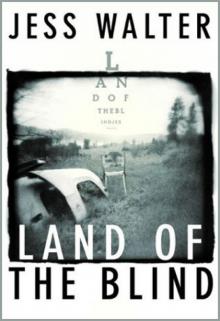 Land of the Blind
Land of the Blind Don't Eat Cat
Don't Eat Cat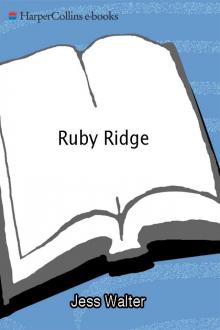 Ruby Ridge: The Truth and Tragedy of the Randy Weaver Family
Ruby Ridge: The Truth and Tragedy of the Randy Weaver Family Citizen Vince
Citizen Vince Beautiful Ruins
Beautiful Ruins We Live in Water
We Live in Water The Zero: A Novel
The Zero: A Novel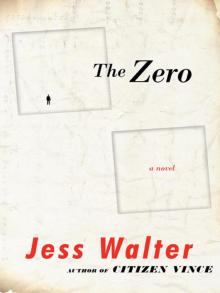 The Zero
The Zero The Cold Millions
The Cold Millions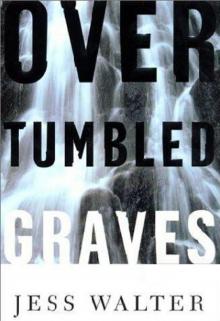 Over Tumbled Graves
Over Tumbled Graves We Live in Water: Stories
We Live in Water: Stories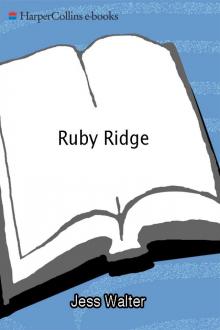 Ruby Ridge
Ruby Ridge (2006) The Zero
(2006) The Zero (2004) Citizen Vince
(2004) Citizen Vince